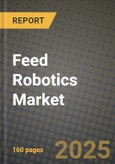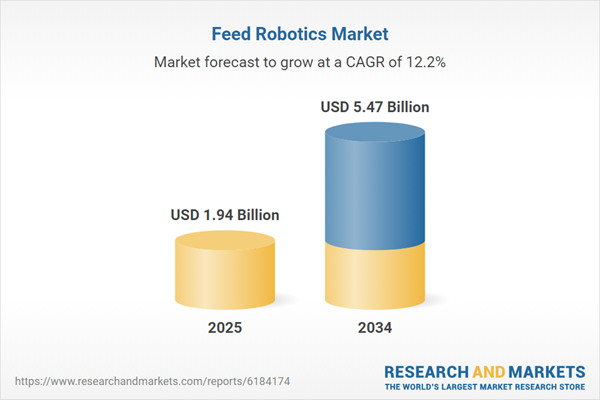Feed Robotics Market
The feed robotics market spans autonomous and semi-autonomous systems that prepare, deliver, and optimize feed across dairy, beef, swine, poultry, aquaculture, and specialty livestock operations. Solutions include robotic feeders and pushers, TMR (total mixed ration) mixers with automated dosing, gantry and rail systems for barns, belt and auger robots with vision-guided distribution, pen-side dispensers linked to RFID/ear-tag ID, AGV/AMR carts, pasture bots, and aquaculture feeders with camera-based biomass estimation. Core value propositions are consistent delivery, labor substitution, reduced waste and refusals, better feed conversion, and improved animal welfare through individualized rations and fresh-feed frequency. Technology trends emphasize edge AI for intake recognition, weight curves and visit patterns; sensor fusion (vision, load cells, acoustics, environmental); digital twins for ration planning and barn flow; and integration with herd/flock management, AMR fleets, milking/egg collection lines, climate control, and manure systems. Providers differentiate with ruggedized designs for dust, moisture, corrosive atmospheres, and wash-down; biosecurity-aware layouts; precise micro-ingredient dosing; and analytics that link ration compliance to health, fertility, and yield. Business models evolve toward subscription and Robot-as-a-Service with uptime SLAs, consumables, and seasonal financing aligned to production cycles. Challenges persist around heterogeneous barn geometries, variable feedstocks and moisture content, sensor fouling, interoperability across legacy controllers, and proof of ROI in smaller units. As farms professionalize and sustainability reporting tightens, buyers favor modular, retrofit-friendly platforms that verify ration accuracy, document emissions-relevant metrics, and integrate into whole-farm automation and traceability programs.Feed Robotics Market Key Insights
- Precision feeding is the lever. Individualized or group-segmented rations matched to lactation stage, genetics, and health status drive conversion efficiency; robots enforce portion size, timing, and consistency beyond manual routines.
- Edge AI turns video into signals. Vision models infer bunk fill, refusal quality, pecking and crowding, and fish appetite; combining with load cells and environmental sensors closes the loop on when/where/how much to feed.
- Fresh-feed frequency matters. Little-and-often delivery stabilizes rumen/gi function and reduces sorting; autonomous pushers and micro-dosing dispensers maintain accessibility for timid animals and late feeders.
- Ruggedization wins barns. Corrosion-resistant materials, sealed drives, hygienic design, and easy-swap wear parts determine uptime under dust, humidity, and caustic residues; simple cleaning workflows cut downtime.
- Interoperability is a gate. Open APIs to herd management, milking parlors, hatchery/house controllers, climate and manure systems reduce double data entry and enable whole-farm optimization.
- Ingredients are variable; robots adapt. Moisture, chop length, pellet durability, and fines shift flow properties; self-calibrating augers, vibration assists, and feedback-controlled dosing maintain accuracy.
- Biosecurity by design. Movement paths, zoned sanitation, and anti-cross-contamination features limit disease spread between pens/houses; remote diagnostics reduce human entries during outbreaks.
- Aquaculture scales autonomy. Camera/sonar-guided feeders adjust to biomass density and behavior, cutting waste and turbidity while documenting FCR and environmental compliance.
- Service models de-risk adoption. RaaS bundles maintenance, updates, and analytics; parts consignment and season-aligned payments match cash flows and stabilize TCO for mid-sized farms.
- Sustainability and reporting. Robots quantify refusals, shrink energy per kg gain, and log inputs/outputs for audits, supporting methane-related strategies and certification programs.
Feed Robotics Market Reginal Analysis
North America
Large dairy and feedlot operations drive demand for TMR automation, bunk management robots, and AMR feed carts integrated with herd software and parlor data. Labor scarcity, biosecurity protocols, and ESG reporting support investments in analytics and remote support. Retrofits to mixed-age barns favor modular systems, while warranty and uptime SLAs influence awards.Europe
High animal-welfare standards and environmental regulation push precision feeding, frequent pushers, and verified ration compliance. Robotic systems integrate with climate and manure solutions for nutrient and emissions control. Compact farms prioritize rail/gantry feeders and micro-ingredient dosing; interoperability, hygienic design, and lifecycle service contracts are procurement essentials.Asia-Pacific
Rapid scaling in dairy, swine, poultry, and aquaculture fuels broad adoption - from cost-optimized pushers to vision-guided dispensers and camera-based pond feeders. Japan and Korea emphasize reliability and sanitation; China accelerates end-to-end barn automation; Australia/New Zealand focus on pasture-based robots and ruggedization for heat/dust. Local integrators and financing options speed rollout.Middle East & Africa
Hot, arid climates and imported feedstocks heighten the value of moisture-robust dosing and waste minimization. Dairy, broiler, and aquaculture hubs adopt systems with strong corrosion resistance, remote diagnostics, and backup power. Government food-security programs and free-zone incentives support turnkey packages with training and spares localization.South & Central America
Beef, dairy, and poultry producers seek labor-saving automation with robust service backing. Budget sensitivity favors phased deployments - feed pushers first, then dosing/AMR carts - managed via RaaS or leasing. Integration with pasture management and silage logistics, plus local maintenance capacity, are decisive in vendor selection.Feed Robotics Market Segmentation
By Product
- Feeding Systems
- Feed Pushers
- Feed Mixers
- Others
By End-User
- Dairy Farms
- Poultry Farms
- Swine Farms
- Others
By Farming Environment
- Indoors
- Outdoors
By Function
- Autonomous
- Semi - Autonomous
By Farm Size
- Small Sized Farms (Below 50 HA)
- Medium Sized Farms (< 50 to 200 HA)
- Large Sized Farms (Above 200 HA)
Key Market players
Lely, DeLaval, GEA Group, BouMatic, Fullwood Packo, Happymoo, Hokofarm Group, FANUC, Yaskawa, KUKA, ABB, Dairymaster, Pearson International, Waikato Milking Systems, MilkomaxFeed Robotics Market Analytics
The report employs rigorous tools, including Porter’s Five Forces, value chain mapping, and scenario-based modelling, to assess supply-demand dynamics. Cross-sector influences from parent, derived, and substitute markets are evaluated to identify risks and opportunities. Trade and pricing analytics provide an up-to-date view of international flows, including leading exporters, importers, and regional price trends.Macroeconomic indicators, policy frameworks such as carbon pricing and energy security strategies, and evolving consumer behaviour are considered in forecasting scenarios. Recent deal flows, partnerships, and technology innovations are incorporated to assess their impact on future market performance.
Feed Robotics Market Competitive Intelligence
The competitive landscape is mapped through proprietary frameworks, profiling leading companies with details on business models, product portfolios, financial performance, and strategic initiatives. Key developments such as mergers & acquisitions, technology collaborations, investment inflows, and regional expansions are analyzed for their competitive impact. The report also identifies emerging players and innovative startups contributing to market disruption.Regional insights highlight the most promising investment destinations, regulatory landscapes, and evolving partnerships across energy and industrial corridors.
Countries Covered
- North America - Feed Robotics market data and outlook to 2034
- United States
- Canada
- Mexico
- Europe - Feed Robotics market data and outlook to 2034
- Germany
- United Kingdom
- France
- Italy
- Spain
- BeNeLux
- Russia
- Sweden
- Asia-Pacific - Feed Robotics market data and outlook to 2034
- China
- Japan
- India
- South Korea
- Australia
- Indonesia
- Malaysia
- Vietnam
- Middle East and Africa - Feed Robotics market data and outlook to 2034
- Saudi Arabia
- South Africa
- Iran
- UAE
- Egypt
- South and Central America - Feed Robotics market data and outlook to 2034
- Brazil
- Argentina
- Chile
- Peru
Research Methodology
This study combines primary inputs from industry experts across the Feed Robotics value chain with secondary data from associations, government publications, trade databases, and company disclosures. Proprietary modeling techniques, including data triangulation, statistical correlation, and scenario planning, are applied to deliver reliable market sizing and forecasting.Key Questions Addressed
- What is the current and forecast market size of the Feed Robotics industry at global, regional, and country levels?
- Which types, applications, and technologies present the highest growth potential?
- How are supply chains adapting to geopolitical and economic shocks?
- What role do policy frameworks, trade flows, and sustainability targets play in shaping demand?
- Who are the leading players, and how are their strategies evolving in the face of global uncertainty?
- Which regional “hotspots” and customer segments will outpace the market, and what go-to-market and partnership models best support entry and expansion?
- Where are the most investable opportunities - across technology roadmaps, sustainability-linked innovation, and M&A - and what is the best segment to invest over the next 3-5 years?
Your Key Takeaways from the Feed Robotics Market Report
- Global Feed Robotics market size and growth projections (CAGR), 2024-2034
- Impact of Russia-Ukraine, Israel-Palestine, and Hamas conflicts on Feed Robotics trade, costs, and supply chains
- Feed Robotics market size, share, and outlook across 5 regions and 27 countries, 2023-2034
- Feed Robotics market size, CAGR, and market share of key products, applications, and end-user verticals, 2023-2034
- Short- and long-term Feed Robotics market trends, drivers, restraints, and opportunities
- Porter’s Five Forces analysis, technological developments, and Feed Robotics supply chain analysis
- Feed Robotics trade analysis, Feed Robotics market price analysis, and Feed Robotics supply/demand dynamics
- Profiles of 5 leading companies - overview, key strategies, financials, and products
- Latest Feed Robotics market news and developments
Additional Support
With the purchase of this report, you will receive:- An updated PDF report and an MS Excel data workbook containing all market tables and figures for easy analysis.
- 7-day post-sale analyst support for clarifications and in-scope supplementary data, ensuring the deliverable aligns precisely with your requirements.
- Complimentary report update to incorporate the latest available data and the impact of recent market developments.
This product will be delivered within 1-3 business days.
Table of Contents
Companies Mentioned
- Lely
- DeLaval
- GEA Group
- BouMatic
- Fullwood Packo
- Happymoo
- Hokofarm Group
- FANUC
- Yaskawa
- KUKA
- ABB
- Dairymaster
- Pearson International
- Waikato Milking Systems
- Milkomax
Table Information
| Report Attribute | Details |
|---|---|
| No. of Pages | 160 |
| Published | November 2025 |
| Forecast Period | 2025 - 2034 |
| Estimated Market Value ( USD | $ 1.94 Billion |
| Forecasted Market Value ( USD | $ 5.47 Billion |
| Compound Annual Growth Rate | 12.2% |
| Regions Covered | Global |
| No. of Companies Mentioned | 15 |









